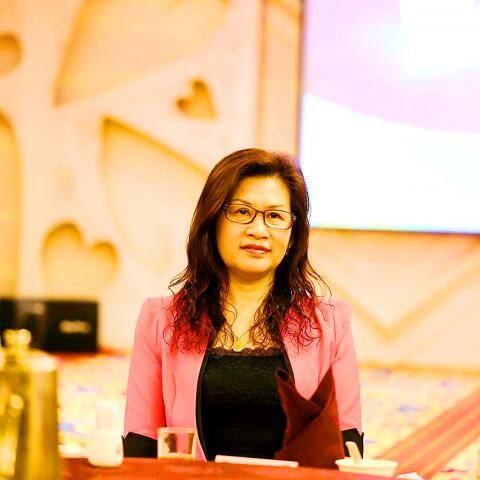《TAIPEI TIMES》 Woman’s acquittal in China spy case appealed

China Unification Promotion Party legislator-at-large nominee Ho Jianghua, who also chairs the Chinese Women’s Federation, is pictured in an undated photograph. Photo: Screen grab from Facebook
BOUNDARIES NEEDED: The court’s ruling was based on ‘freedom of speech,’ but did not assess the clear danger she posed to Taiwan’s national security, prosecutors said
By Chien Li-chung and Jason Pan / Staff reporters
The Taipei District Prosecutors’ Office yesterday filed to appeal the acquittal of former Chinese national Ho Jianghua (何建華), accused of setting up a spying network for China.
Ho was indicted in 2020, allegedly receiving funding and working on espionage activities for China, but was acquitted by the Taipei District Court in its first ruling in February.
The district court’s acquittal on the basis of “freedom of speech” was flawed, prosecutor Lin Ta (林達) wrote in the appeal, adding that it did not assess the clear danger she posed to national security and did not take her actions into account.
Those actions include holding meetings in Beijing, receiving more than NT$400,000 in funding from the Chinese United Front Work Department, evidence of engaging in espionage, collecting personal information and subverting Taiwan’s democratic system.
The acquittal did not examine her efforts to develop a network for the Chinese government and the judge detached this portion presented in the indictment, Lin said.
In doing so, the court judge nullified the application of Article 2 of the amended National Security Act (國家安全法), which prohibits the “funding, hosting ... directing or developing an organization” for a hostile foreign state, he added.
An investigation showed that Ho had established an organization for Chinese women and spouses living in Taiwan, drafted its charter and working programs, and led members in a visit to Beijing where they reported to Chinese officials and agreed to become a Chinese government-affiliated organization, Lin said.
The appeal said that Ho headed the organization, set up channels for funding from Beijing and initiated plans to execute several programs, one of which was to “identify personal details of Chinese nationals living in Taiwan” and “track their activities.”
Ho was supported financially by Beijing for these efforts and it helped fund events in Taiwan that aimed to entice Chinese nationals to attend, including Chinese spouses who have become Taiwan citizens, it said.
“Through these efforts and events planning, Ho would contact and recruit Chinese nationals in Taiwan to become members and work for her, further developing her organization. One of their programs was to collect personal details and sensitive information, and to report on those who are supporting Taiwanese independence,” Lin said.
Ho also instructed members to attend rallies and support certain parties and candidates during election campaigns, she said.
“Overall, from the evidence and observation of these activities, it can be deemed that [Ho] has contravened Article 7 of the National Security Act’s ‘intends to endanger national security or social stability’ on behalf of China,” he said.
“Based on an objective assessment, Ho had initiated, funded and arranged her organization in a way that leads to ‘clear and immediate danger’ to undermine Taiwan’s national security and social stability ... therefore, the district court’s ruling is flawed,” Lin said.
“Through the appeal, we can also use this case to start a legal discourse on the boundaries between national security and freedom of speech, and to clarify the requirements of ‘developing an organization’ on behalf of a hostile foreign state,” he said.
It is important to differentiate it from “freedom of speech,” a basic right protected under the Constitution, he said.
The justice system should have an accurate understanding of its fundamental principle and should not be used to protect every unlawful action, he added.
“In Taiwan, our citizens have freedom of speech, by which a person can, in political discourse, advocate for ‘unification with China.’ However, the person’s intent and actions must not amount to ‘colluding with China or other hostile states, in conspiring to destroy our nation’s political system as a democratic republic,’” he said.
“The courts must refrain from abusing the concept of ‘freedom of speech’ to grant an acquittal,” Lin said.
新聞來源:TAIPEI TIMES




















